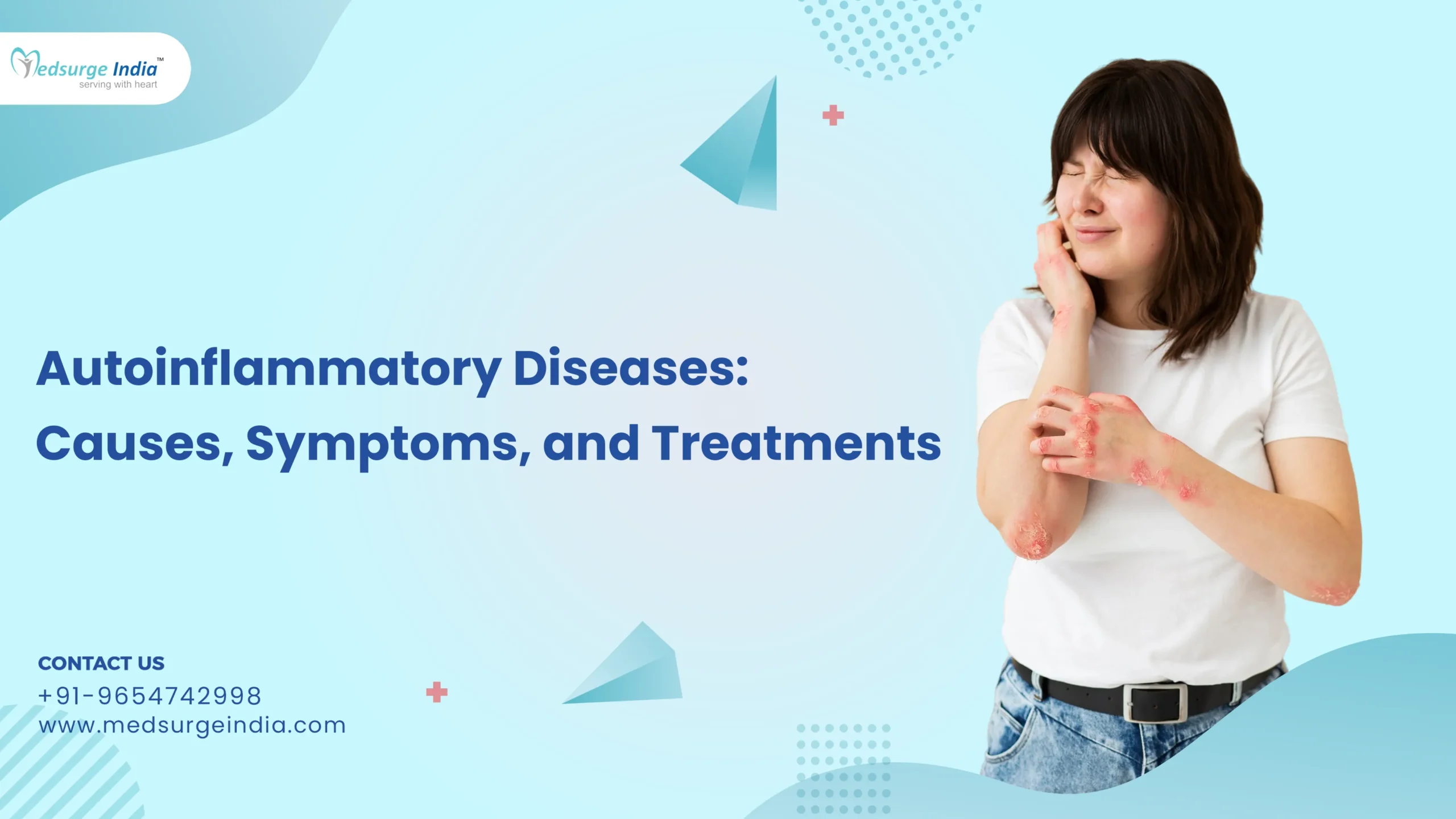
Autoinflammatory Diseases: Causes, Symptoms, and Treatments
Autoinflammatory diseases are new-generation disorders that have occurred due to genetic mutations leading to dysfunction of one arm of the immune system, namely, innate immunity. These conditions are characterized by fevers, rashes, arthralgias and myalgias, abdominal pain, and a systemic inflammatory response as seen in laboratory studies.
Autoinflammatory diseases can be classified into two – hereditary and acquired, and as much as half of them occur in childhood and persist in the affected patients throughout their adult lives. They will impact on several members of the same family. Sometimes one of these conditions develops when a gene mutation happens and this leads to the creation of the new condition.
An acquired auto-inflammatory disease may manifest at any age, that is, as a child or even as an adult. Autoinflammatory diseases are conditions where the body’s immune system responds abnormally and without cause, and here’s what you should know about them.
Types of Autoinflammatory Disease
Autoimmune diseases are diseases that are related to the failure of the body’s immune system. These diseases influence the cell-mediated immune system which is the organisms’ broad defense against infections. This makes them different from autoimmune diseases such as rheumatoid arthritis, and multiple sclerosis that involve malfunction of the adaptive immune system.
Some of the autoinflammatory diseases include:
- Hyper IgD syndrome (HIDS)
- Adult-onset Still’s disease
- VEXAS syndrome
- Behcet’s Disease
- Familial Mediterranean fever (FMF)
- Cryopyrin-associated periodic syndromes (CAPS)
- TNF receptor-associated periodic syndrome (TRAPS)
- Deficiency of IL-1-receptor antagonist (DIRA)
Autoinflammatory vs. Autoimmune Diseases
Autoimmune and autoinflammatory diseases share an aspect of the immune system going wrong. Both of them can result in similar signs like pain and swelling in the joints; skin rash; and fatigue.
It is important to know that what sets apart these two types of disease categories from each other is the cause. Since the cause is different, so is the treatment of these diseases. They can also lead to different consequences, complications, and adversities in the future.
Autoinflammatory diseases involve innate immunity while autoimmune diseases involve adaptive immunity.
This type of immunity is acquired throughout a person’s life, how to react, or which pathogens to fight. Adaptive immunity is a process that handles pathogens and produces antibodies to handle that type of pathogen in case they appear again. The adaptive immune system targets particular antigens.
The innate immunity of the body is not selective or sophisticated. Instead, it will employ white blood cells as well as acute inflammation which is a short-term condition to deal with a pathogen.
Autoinflammatory Disease Symptoms
Recurrent fever is the most prevalent symptom associated with autoinflammatory conditions. Other symptoms that may manifest include:
- Chills
- Inflammation of muscles and joints
- Inflammation of internal organs
- Skin rashes
- Gastrointestinal issues, such as abdominal pain
- Amyloidosis, characterized by the accumulation of amyloid protein in the kidneys
- Sores in the mouth or genital area
- Redness and swelling of the eyes
- Enlarged lymph nodes
Due to the systemic inflammation caused by these conditions, they can impact various organs and bodily systems. Complications related to these conditions may encompass:
- Involvement and impairment of multiple organs
- Ocular issues resulting from inflammation of the eyes
- Respiratory complications
- Elevated risk of osteoporosis, a condition characterized by weakened bones and a higher incidence of fractures.
Causes
Autoinflammatory diseases arise from alterations in the genes that govern the innate immune system. These genetic modifications are frequently inherited from parents to offspring, leading to multiple instances of an autoinflammatory disease within a single family.
Although uncommon, autoinflammatory diseases may also emerge from novel gene mutations that occur early during embryonic development. Such mutations can be instigated by environmental influences, including trauma or illness, resulting in the onset of an autoinflammatory disease.
Recent advancements in genetics have enabled researchers to pinpoint the genetic alterations associated with these disorders. This progress has facilitated the diagnosis of specific autoinflammatory diseases based on the identifying genes responsible for their manifestation.
Diagnosis
The diagnosis of an autoinflammatory disease can be established through a comprehensive physical examination, an assessment of family medical history, laboratory blood tests, and genetic analysis. The following elements may be anticipated:
Physical examination: The healthcare provider will inquire about your signs and symptoms and examine the skin and joints. Skin manifestations are crucial for facilitating an early diagnosis and formulating an effective treatment strategy.
Assessment of family medical history: A familial background of an autoinflammatory disorder heightens the probability of developing the condition.
Laboratory blood tests: During a flare-up, blood tests may reveal increased levels of specific markers that signify inflammation within the body, such as elevated white blood cell counts.
Genetic analysis: Genetic testing can assist in identifying whether you possess a particular gene mutation linked to an autoinflammatory disease.
Treatment
The primary objectives in managing autoinflammatory diseases are to mitigate inflammation and inhibit the excessive immune system response. Therapeutic interventions are also aimed at alleviating recurrent fever, pain, and other symptoms associated with the inflammatory process.
In the initial stages of treatment, corticosteroid therapy and nonsteroidal anti-inflammatory drugs (NSAIDs) are commonly employed to address inflammation. However, long-term use of corticosteroids is not advisable due to the potential for significant adverse effects, including increased intraocular pressure, leg edema, hypertension, mood fluctuations, cognitive impairments, and weight gain.
Colchicine, which is the preferred treatment for gout—a type of arthritis resulting from uric acid crystal accumulation in joints—has proven effective in managing familial Mediterranean fever and in preventing related complications.
Additionally, antitumor necrosis factor (TNF) therapy has been successfully utilized in the treatment of various autoinflammatory diseases. Other biologic agents, such as Anakinra (Kineret) and Ilaris (canakinumab), which inhibit the interleukin-1 protein, have demonstrated effectiveness in treating several of these conditions.
Also Read: Best Rheumatologists in Gurgaon
Take Away
Autoimmune diseases encompass a variety of conditions that arise when the immune system erroneously attacks healthy tissues within the body. The precise reasons for this misdirected response remain unclear to scientists. Most therapeutic approaches focus on moderating the hyperactive immune response.
Autoinflammatory diseases present a complex array of causes, symptoms, and treatment methodologies. Living with these conditions can be particularly difficult; however, ongoing research aims to enhance the understanding and diagnosis of these disorders.
The field of research dedicated to the treatment of autoinflammatory diseases is expanding, with scientists actively seeking improved therapies that specifically target the overactive components of the innate immune system.
If there is a familial history of these conditions, it is advisable to consult with a healthcare professional regarding any concerns for your children. Additionally, should you observe symptoms indicative of these disorders in your child, or if you experience them as an adult, it is important to reach out to your healthcare provider. Early diagnosis can significantly facilitate treatment and help avert potential complications.






